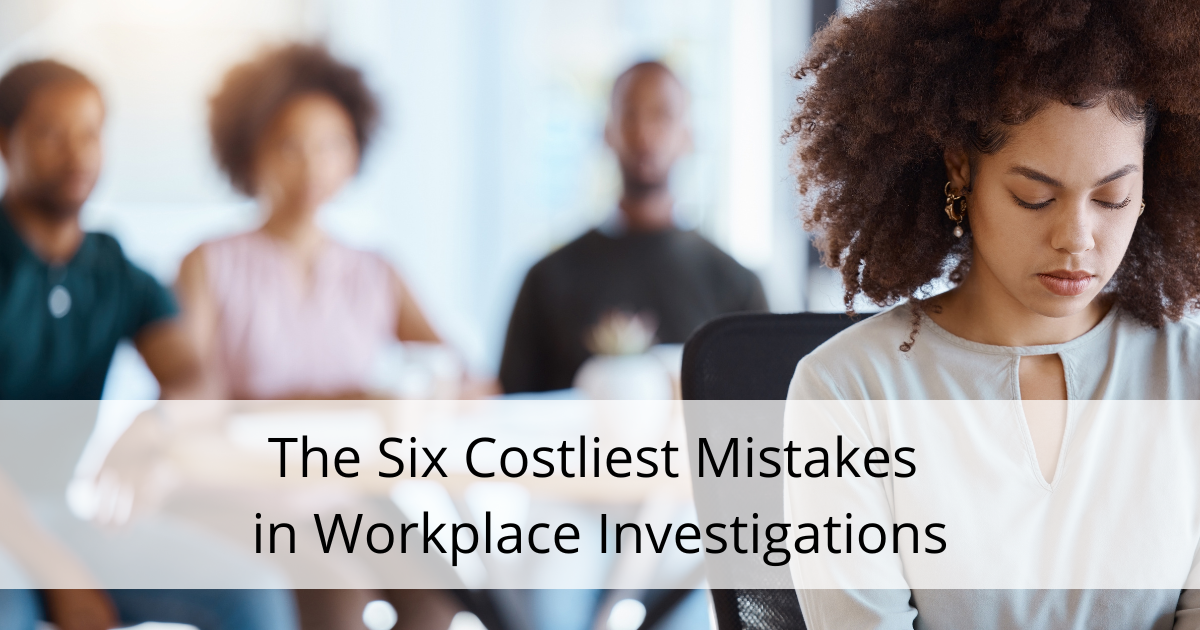Resources > Blog > The Six Costliest Mistakes in Workplace Investigations

In my practice, I review complaints of workplace harassment from a number of different perspectives – as an external investigator conducting the initial review; as an external investigator conducting a re-investigation because of procedural flaws in the first one; and as a labor arbitrator reviewing an investigation report in the course of a hearing.
Based on my experience, here are the six costliest mistakes that organizations make when it comes to investigating informal and formal complaints of workplace harassment (and other matters!):
- Workplaces don’t investigate complaints – at all – and allow the alleged conduct to continue. Workplace leaders and HR professionals have a duty to inquire into workplace complaints as soon as they have been made aware of their existence. An employer’s actual or deemed knowledge of a specific concern is a question of fact based on an objective evaluation of the circumstances in existence at the time. If those circumstances indicate that someone in authority was or should have been “reasonably aware” of an outstanding concern and has failed to inquire into it, then the organization likely will be viewed as being partially liable for the continuing risk and resulting damage to those impacted by the behavior in question.
- Workplaces don’t investigate complaints in a timely manner. This one is a close “cousin” to the first and is present when the employer takes far too long to begin its investigation. “What took you so long?” is the question that employers will be expected to answer, with evidence in support. Employers who are unable to demonstrate a reasonable basis for their delay in initiating the investigation, will be exposed to similar damages as those set out in (1) above.
- Workplaces do not “triage” their initial complaints properly to determine which type of investigation process is reasonably necessary. Some serious and formal workplace complaints require an external investigation; while many others do not. Organizations should not follow a rigid, prescriptive or one-size-fits-all approach in determining whether to conduct an internal or external investigation. They might consider investing in neutral advice, from the outset, to assess which process will be most cost-effective, timely, defensible and reasonable given the nature and severity of the allegations being raised.
- Some workplace investigators take an unreasonable amount of time to conduct investigations. This is the same question as number (2) above – “What took you so long?” but in a different context. Too many workplace investigations begin in a timely manner but then drag out over many months and at times, take well over a year to complete. This delay often results in additional financial costs to an employer and increased emotional costs (including debilitating stress and anxiety) for both the complainant and respondent, and to a lesser extent, witnesses and the team as a whole. Timely clarity and closure are critical components to a defensible and respectful complaint process. Investigators – both internal and external – should be mandated to complete their investigations within a reasonable and well-defined window of time. If there are concerns that this might not be possible due to other commitments or workload pressures, then there should be a frank discussion at the outset, prior to agreeing to conduct the investigation.
- Workplace investigations do not comply with procedural fairness. A workplace investigation may not be considered defensible or objective in a number of circumstances, the most common of which include: actual or perceived bias by the investigator in favor of (or against) a complainant or respondent; failure to disclose allegations to the person(s) being accused; and failure to give the accused a genuine, full and fair opportunity to defend themselves. Unfair investigations often result in inaccurate findings and baseless conclusions which are subsequently overturned in subsequent and costly litigation.
- Workplaces don’t investigate complaints – they simply act on them. At times, organizations unquestioningly accept the validity of a complaint or concern without objectively inquiring into it. They do not provide the accused with any investigation at all – in fact, many individuals in these circumstances are informed of the allegations against them at the same time they learn of their punishment. This often leads to adverse media exposure, reputational damage and significant monetary damages against an organization from claims in defamation, wrongful dismissal, breach of contract, intentional/negligent infliction of mental distress and otherwise.
Workplace investigations should be conducted in order to objectively inquire into concerns in a reasonable and timely manner. When they don’t happen at all, take too long to finish or are conducted in a biased manner, they end up being part of the problem instead of the solution.
I’ve seen too many people – and teams – devastated by the costly and avoidable mistakes set out above. Let’s work harder on our workplace investigations to stop this from happening.
Please contact me to discuss my expedited three-hour virtual training course on conducting defensible workplace investigations; or to retain me to triage or conduct your workplace complaints (in a timely and objective
manner!).
Learn about my “How to Conduct Defensible Investigations” workshop
Contact me to Set up “How to Conduct Defensible Investigations” in your Workplace
